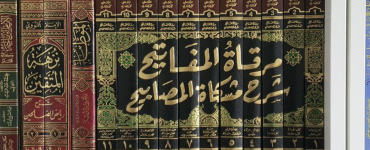An excerpt translated from the Dars-e-Tirmidhi of Mufti Taqi Usmani.
Attaining aḥādīth from a shaykh technically is known as taḥammul (تحمل) and this branches off into 5 types.[1]
- (السماع) – Listening, this is where the teacher reads and the students listen, hence in this scenario the student would say: – ((حدثني, ((اخبرني or by saying (سمعت فلانا يقول). There is a discussion as to which word is best to use. Some scholars have preferred using the term (سمعت) whilst others have preferred using the term (حدثني).
- (القراءة علي الشيخ) – in this method the student reads whilst the teacher listens, it is also permissible for the student to narrate from the teacher in this scenario too. This type consists of terminologies such as; – (اخبرني), (انباني) and (قرات عليه) However, if there is more than 1 person in the gathering then the following will be said instead: (اخبرنا), (انبانا). Some scholars have also made a differentiation between these two terms:
- The student who is reading will say (اخبرنا).
- The students listening will say (انبانا) – however for this term the addition of (قرات عليه) and (و انا اسمع) is better.
Furthermore, there is the difference of opinion as to whether (سماع) is more virtuous than (قراءة علي الشيخ). It is narrated from Imam Mālik and Imam Shāfiʿī that they say (سماع) is more virtuous. According to Imam Abū Ḥanīfah (قراءة علي الشيخ) is more virtuous. The reasoning for this is out of cautiousness, as there may be a mistake made by the student by which the teacher can correct. Ḥāfiẓ Sakhāwī makes a distinguishing factor by stating that in whichever method you could avoid mistakes, then that is the most virtuous one. And at times that could be (سماع) and at times it could be (قراءة).
- (المراسلة و المكاتبة) – Writing down a narration (i.e. on paper) and giving it to someone. Is this method permissible for a student to use? According to some scholars, until the teacher doesn’t give clear permission then it is not permissible for the student to narrate that ḥadīth, however if the student knows which teachers letter it is then it is permissible for him to narrate even if the permission wasn’t explicit. With that being said, the words (حدثني), (اخبرني) cannot be used here, rather the terms (كاتبني), (كتب الي) or (ارسل الي) will be used.
- (المناولة) – When the teacher gives his book of narrations to a student. Some scholars have also said that this type of narration requires the student to take permission from the teacher beforehand but the distinguishing factor here is that the teachers clear permission is not required. If the student is convinced that these narrations were all given to the student by the teacher to narrate, then he can do so. With that being said, saying (حدثني) or (اخبرني) is not appropriate, rather he should say (ناولنني).
- (الوجادة) – Narrating from a scholar by finding a certain book of his. In regard to this many muḥaddithūn opine that that it is not permissible to do this as it is possible that the majority of the narrations could be weak or that the scholar has collected them for (معلومات) purposes only. Some scholars have given permission to this and have said that if he knows the scholar and relies on him then there is no problem in him saying (وجدت بخط فلان).
[1] These terms are now metaphorical as before students would hear aḥādīth directly from their teachers for the first time. Now, since the aḥādīth have been printed in book form, these terms are all implied.






